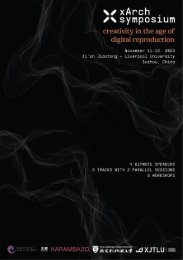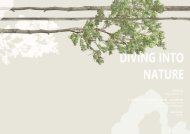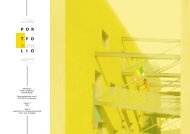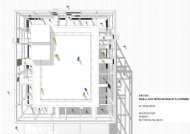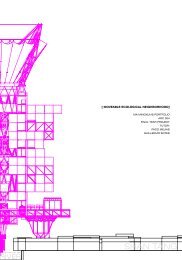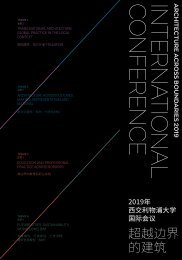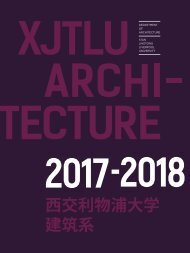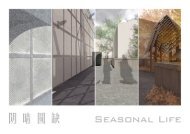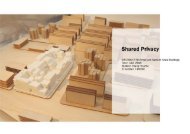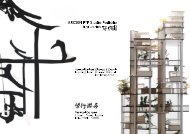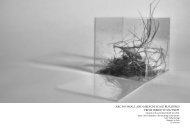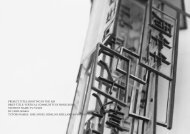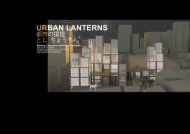YEARBOOK 2018 - 2019 | XJTLU DEPARTMENT OF ARCHITECTURE
The sixth edition of the yearbook of the Department of Architecture at Xi'an Jiaotong-Liverpool University presents student works created during the academic year 2018 - 2019. The yearbook exemplifies the new model for Chinese architectural education for which the department was commended by the Royal Institute of British Architects (RIBA). It is also a showcase of the creative culture that has guided our students towards successful international careers as responsible and creative architectural designers. The Department of Architecture at XJTLU offers RIBA Part 1, 2 and 3.
The sixth edition of the yearbook of the Department of Architecture at Xi'an Jiaotong-Liverpool University presents student works created during the academic year 2018 - 2019. The yearbook exemplifies the new model for Chinese architectural education for which the department was commended by the Royal Institute of British Architects (RIBA). It is also a showcase of the creative culture that has guided our students towards successful international careers as responsible and creative architectural designers. The Department of Architecture at XJTLU offers RIBA Part 1, 2 and 3.
Create successful ePaper yourself
Turn your PDF publications into a flip-book with our unique Google optimized e-Paper software.
305<br />
306<br />
The research strategy of the Department of Architecture is focused on<br />
three research areas:<br />
History, Theory and Heritage<br />
History, theory and heritage are fields of expertise of increasing<br />
importance in contemporary China. In the context of profound<br />
economic and social transformation, focus on the relationship between<br />
modernisation and tradition has taken centre stage. This applies in<br />
particular to the Suzhou region, where a number of significant historical<br />
sites and artefacts are located.<br />
<strong>2018</strong>-<strong>2019</strong> <strong>YEARBOOK</strong> Xi’an Jiaotong-Liverpool University Department of Architecture 西 交 利 物 浦 大 学 建 筑 系<br />
RESEARCH<br />
Our staff possess strong and diversified backgrounds in the history<br />
and theory of architecture and building heritage, the Department of<br />
Architecture is ideally placed to engage in studies and research on these<br />
subject matters. The history, theory and heritage research area covers a<br />
variety of fields of interest, including history and theory of architecture,<br />
urban history, landscape history, building heritage, cultural and material<br />
history, and industrial heritage.<br />
Computational Design and Fabrication<br />
Digitally aided design and construction are key areas in which the<br />
Chinese building industry has potential for development and a need for<br />
innovation. These areas have only recently found significant recognition<br />
amongst Chinese universities.<br />
Strengths of the Department of Architecture’s academic staff, the recent<br />
establishment of <strong>XJTLU</strong>’s Research Institute on Industrial Design and<br />
3D Printing, and emerging relationships with related local industry offer<br />
our Department an opportunity to assume a position of leadership in<br />
this field.<br />
Urban Ecologies<br />
To address the challenges of contemporary urban environments<br />
creative solutions are needed. This applies in particular to China, where<br />
cities currently face the challenges of enormous transformations at<br />
an unprecedented pace. Within this context, urban ecologies seeks to<br />
research the changing nature of the urbanising world; to link questions<br />
of human interactions within developing cities to the political, social<br />
and cultural and environmental discourse; to explore and critique the<br />
sustainability and liveability of contemporary urbanism.<br />
Initiated by <strong>XJTLU</strong>’s Department of Architecture, the urban ecologies<br />
research platform offers a unique opportunity for inter-disciplinary<br />
and comparative approaches that consider the design and the design<br />
processes of the built environment. Urban ecologies allows for existing<br />
paradigms to be questioned, and for radically new approaches to the<br />
study of cities and their environment that take into account scientific<br />
and technological research as well as research in sociology, art, design<br />
and aesthetics.




